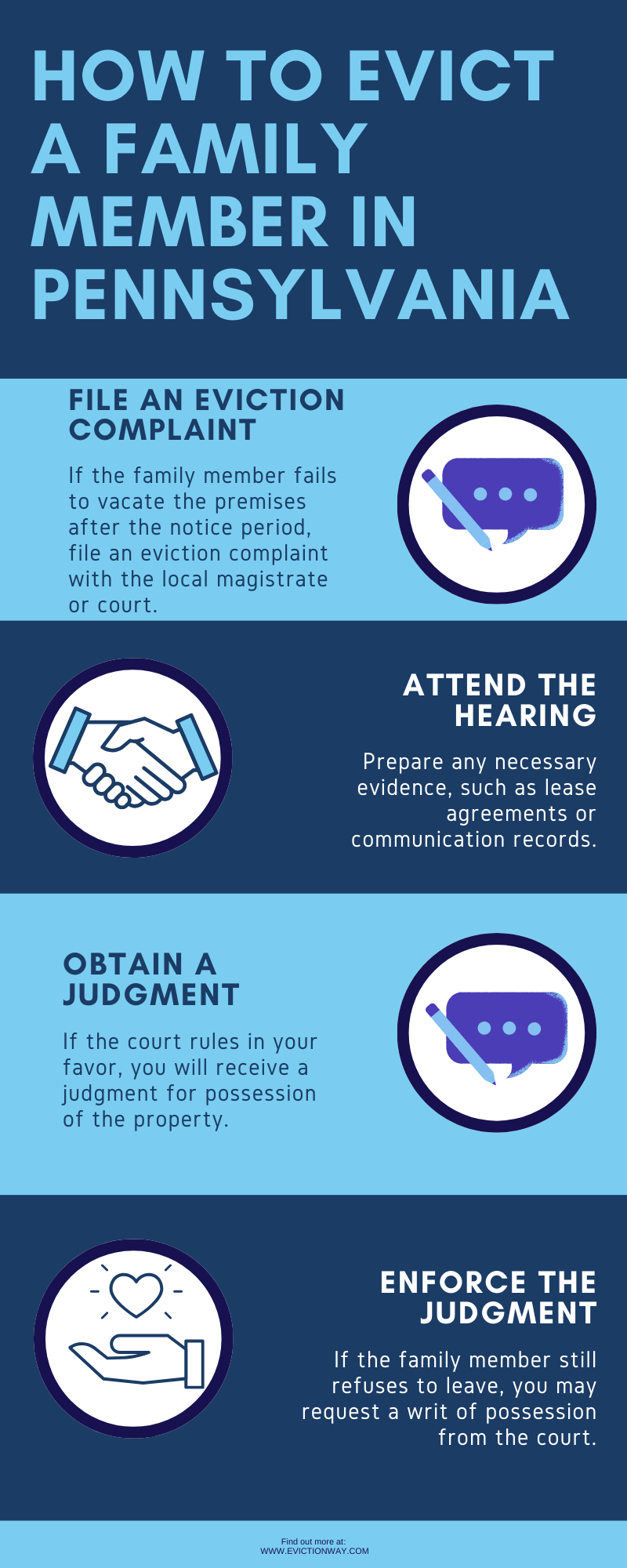Evicting a family member can be a tough situation, but it’s important to know your rights and options. In this article, we’ll walk you through the process of evicting a family member in Pennsylvania. We’ll cover everything from the legal requirements to the practical steps you need to take.
First, it’s important to understand the legal grounds for eviction. In Pennsylvania, you can evict a family member if they have violated the terms of their lease or rental agreement, if they have caused damage to the property, or if they have engaged in illegal activity. If you’re not sure whether you have legal grounds to evict your family member, it’s best to consult with an attorney.

Once you’ve determined that you have legal grounds for eviction, you need to follow the proper legal procedures. In Pennsylvania, you must give your family member written notice of eviction. The notice must state the reason for the eviction and the date by which they must vacate the property. If your family member does not vacate the property by the deadline, you can file a formal eviction lawsuit with the court.
How To Evict a Family Member In Pennsylvania
Evicting a family member can be a difficult and emotional process, but it is sometimes necessary to protect your rights and property. If you are considering evicting a family member in Pennsylvania, it is important to understand the legal process and your rights as a landlord.
1. Determine If You Have Legal Grounds for Eviction
In Pennsylvania, you can only evict a family member if they have violated the terms of their lease or rental agreement. Common reasons for eviction include:
- Nonpayment of rent
- Violation of lease terms (e.g., smoking in a non-smoking unit)
- Criminal activity
- Damage to the property
2. Provide Written Notice
Once you have determined that you have legal grounds for eviction, you must provide your family member with written notice. The notice must state the reason for the eviction and the date by which they must vacate the property.
3. File a Complaint with the Court
If your family member does not vacate the property by the deadline, you will need to file a complaint with the court. The complaint will state the reason for the eviction and request that the court issue an order of possession.
4. Attend a Court Hearing
Once you have filed a complaint, the court will schedule a hearing. At the hearing, you will have the opportunity to present your case and your family member will have the opportunity to defend themselves.
5. Obtain an Order of Possession
If the court finds in your favor, it will issue an order of possession. This order will give you the legal right to evict your family member from the property.
6. Enforce the Order of Possession
Once you have obtained an order of possession, you can have your family member evicted by the sheriff. The sheriff will remove your family member from the property and change the locks.

How Much Does it Cost to Evict a Family Member in Pennsylvania?
Evicting a family member can be a difficult and expensive process. The cost of eviction will vary depending on the specific circumstances of the case, but there are some general costs that you can expect to incur.
| Expense Category | Approximate Cost Range | Notes |
|---|---|---|
| Court Filing Fee | $50 to $150 | Dependent on the county and type of complaint. |
| Service of Process | $30 to $100 | Varies by the service method used. |
| Attorney Fees | $500 to $10,000+ | Based on complexity, attorney’s rates, and length of the case. |
| Landlord and Tenant Act Filing Fee | $20 to $50 | If applicable, based on the district court. |
| Sheriff’s Eviction Fee | Around $150 to $300 | For the physical eviction carried out by a sheriff or constable. |
| Locksmith (if needed) | $80 to $250 | To change locks after eviction, if required. |
| Storage of Tenant’s Belongings | Varies | Costs if there’s a legal requirement to store the tenant’s property. |
| Lost Rent (opportunity cost) | Varies | The potential income lost during the eviction process. |
| Repairs and Cleaning | Varies | Costs for property repairs and cleaning after tenant eviction. |
| Miscellaneous | Varies | Can include court appearances, additional notices, etc. |
- Filing fees: The first step in the eviction process is to file a complaint with the court. The filing fee for an eviction complaint in Pennsylvania is $150.
- Service of process: Once the complaint has been filed, it must be served on the tenant. The cost of service of process will vary depending on the method of service.
- Attorney fees: If you hire an attorney to represent you in the eviction process, you will be responsible for their fees. Attorney fees can vary widely, so it is important to get a quote from an attorney before hiring them.
- Court costs: If the case goes to trial, you will be responsible for court costs. Court costs can include the cost of the jury, the bailiff, and the court reporter.

FAQs: Evicting a Family Member in Pennsylvania
Evicting a family member can be a difficult and emotional process. However, it is important to remember that you have rights as a landlord, and you should not be afraid to enforce them if necessary.
What are the grounds for eviction in Pennsylvania?
There are a number of grounds for eviction in Pennsylvania, including:
- Nonpayment of rent
- Violation of the lease agreement
- Nuisance behavior
- Criminal activity
- Health or safety violations
What is the process for evicting a family member in Pennsylvania?
The process for evicting a family member in Pennsylvania is as follows:
- Give the tenant a written notice to vacate.
- File a complaint with the district magistrate.
- Attend a hearing.
- If the magistrate rules in your favor, you will be issued a writ of possession.
- Have the sheriff evict the tenant.
Can I evict a family member without going to court?
In some cases, you may be able to evict a family member without going to court. This is only possible if the tenant agrees to leave voluntarily. You can try to negotiate a settlement with the tenant, or you can offer them financial assistance to help them move out.

What are my rights as a landlord?
As a landlord, you have the right to:
- Collect rent
- Enforce the lease agreement
- Evict tenants who violate the lease agreement
- Make repairs to the property
- Enter the property with reasonable notice
What are my responsibilities as a landlord?
As a landlord, you have the responsibility to:
- Provide a habitable living space
- Make repairs to the property
- Follow the law
- Respect the tenant’s privacy
- Discriminate against tenants
Related:
